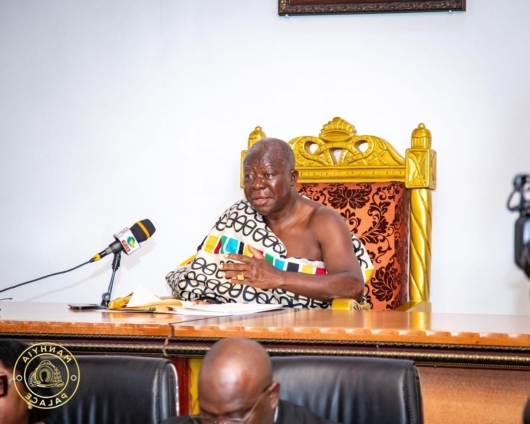
The Asantehene, Otumfuo Osei Tutu II, has appealed to the government to prioritise local investors in the allocation of mining concessions before considering any partnerships with foreign companies.
His Majesty made this call during a crucial meeting with officials from the Ministry of Lands and Natural Resources and the Minerals Commission at Manhyia Palace.
The meeting focused on a government proposal for a comprehensive review of Ghana’s Minerals and Mining Act, 2006 (Act 703), a legislative overhaul aimed at enhancing sector governance and increasing the role of traditional authorities in mining.
Speaking with conviction, Otumfuo Osei Tutu II emphasised the direct economic benefits of empowering Ghanaian investors in the nation’s lucrative mining sector.
“We need to prioritise Ghanaians in the allocation of mining concessions. If they later choose to partner with foreign investors, that should be their decision,” the Asantehene asserted.
He passionately articulated how this approach could significantly strengthen the local economy.
“This approach will strengthen the local currency. Once they secure the lease, they can list on the stock exchange and raise capital to purchase equipment for mining operations here in Ghana. Don’t our young people also deserve the opportunity to invest in the stock market and earn returns?”
Ghana is Africa’s largest gold producer and a significant source of other minerals like manganese and bauxite.
The mining sector is a major contributor to Ghana’s economy, often accounting for over a third of total export revenues and attracting a significant portion of Foreign Direct Investment (FDI).
However, the benefits of this wealth have often been disproportionately enjoyed by foreign entities, leading to calls for stronger local content and participation.
The Minerals and Mining Act, 2006 (Act 703) and the subsequent Minerals and Mining (Local Content and Local Participation) Regulations, 2020 (L.I. 2431), were designed to boost job creation and ensure that a greater portion of mining-related expenditure remains within the country.
L.I. 2431, for instance, mandates localisation programs for hiring and training Ghanaians, sets quotas for expatriate hires, and requires mining companies to procure goods and services from a specified “Local Procurement List.”
The Minerals Commission regularly updates this list, which has grown from eight products initially to 50 products in its latest edition.
Despite these legislative efforts, the Asantehene’s appeal highlights a perceived gap in implementation, where local businesses still struggle to secure primary concessions.
Empowering Ghanaians to take the lead in concession acquisition would allow them greater control over partnerships and capital generation, potentially leading to more wealth retention within the country.
A key point of contention in Ghana’s mining sector has long been the relationship between traditional authority over land and the state’s ownership of minerals.
While chiefs, as custodians of stool lands (which constitute about 80% of Ghana’s landmass), traditionally controlled land use, the legal framework established post-independence, particularly the 1992 Constitution (Article 257(6)), vests ownership of all minerals in their natural state in, under, or upon land, rivers, and the territorial sea in the Republic of Ghana, held in trust by the President for the people.
The Asantehene meticulously clarified this legal reality, exonerating the Minerals Commission from blame for the current framework.
“The Minerals Commission is operating within the confines of the law. Any changes to the current framework must be addressed through the Constitutional Review Committee,” Otumfuo stated.
This acknowledgement signals that a fundamental shift in mineral ownership and concession allocation, beyond policy adjustments, would necessitate a broader constitutional amendment.
This position from the Asantehene, a highly influential traditional ruler, is significant as it provides clarity on a frequently misunderstood aspect of Ghana’s mining law.
It redirects the conversation towards a more structured and legal pathway for enhancing local participation in the sector.
The ongoing review of Act 703, with input from traditional authorities, represents a critical opportunity for Ghana to align its mining policies with its national development aspirations, ensuring that the benefits of its mineral wealth truly accrue to its citizens.
DISCLAIMER: The Views, Comments, Opinions, Contributions and Statements made by Readers and Contributors on this platform do not necessarily represent the views or policy of Multimedia Group Limited.
DISCLAIMER: The Views, Comments, Opinions, Contributions and Statements made by Readers and Contributors on this platform do not necessarily represent the views or policy of Multimedia Group Limited.


